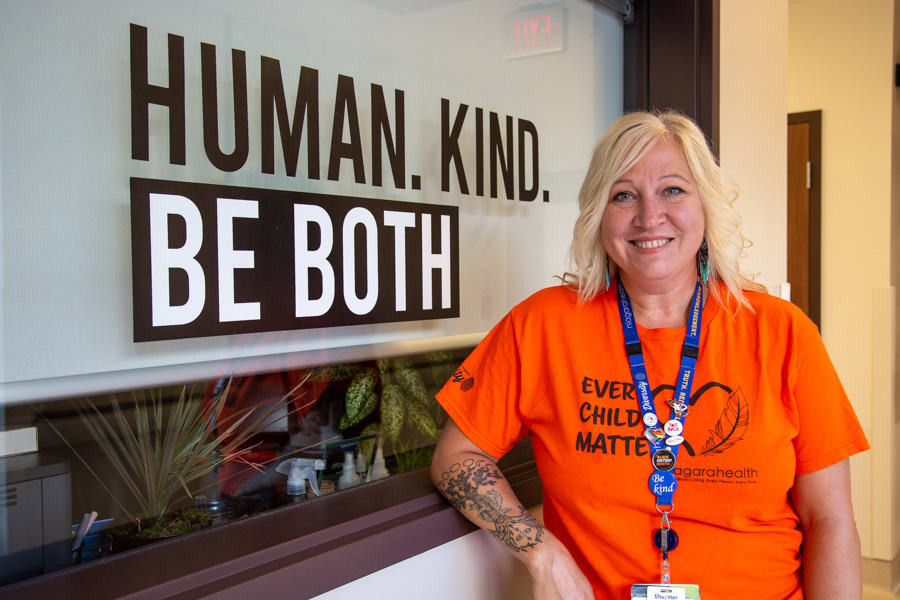We are Niagara Health is a series of stories that celebrates the incredible people working and volunteering in our organization and how they make a difference in the lives of patients and coworkers every day.

Debby Schaubel, a senior project manager in Niagara Health's Enterprise Project Management Office, has made significant efforts to learn about Indigenous Peoples, their cultures and their history, and has become an ally in the process.
Debby Schaubel was moved to tears the first time she heard an Indigenous person speak in their language.
The Senior Project Manager in the Enterprise Project Management Office (ePMO) couldn’t explain to those with her at the time why it was such an emotional experience. But it did start a series of revelations for Schaubel.
“It amazed me. He was speaking his native tongue that I’d never heard spoken before,” Schaubel says. “I was born and raised in Niagara and had no idea this language was spoken here. We never learned about these languages in school. I was really struck by it.”
Until that moment in 2021, the non-Indigenous woman says she didn’t really know much about Indigenous Peoples in what’s now known as Canada.
Driven by that experience, Schaubel has made significant efforts to learn. It started with completing the San’yas Indigenous Cultural Safety Training for those working in the health sector -- training that Niagara Health supports for all physicians and staff, and requires of all leaders.
Next came relationships with Niagara Health’s Indigenous Health Services and Reconciliation (IHSR) team, which started in January 2023. The IHSR team provides support to Indigenous patients and their families coming into the hospital. As part of the ePMO, Schaubel helped the original trio of Charity Beland, Jolene Courchene and Bethany Williams onboard and get acquainted with the organization.
From there, Schaubel didn’t hesitate when she was tapped to support the IHSR team with creating Niagara Health’s smudging policy, which enables smudging by Indigenous patients or family members at any time across all five Niagara Health sites, and was a tangible move toward providing culturally and spiritually appropriate care to Indigenous Peoples.
And in June 2023, when the organization hosted sacred fires at each site over one week, Schaubel eagerly lent her hand to helping the IHSR team co-ordinate with five different municipal fire departments and internal facilities staff to facilitate what she says was another milestone in her learning.
A sacred fire is a spiritual ceremony used to connect and communicate with ancestors. When Schaubel checked in on a staff member moved to tears at one of the fires, she sought answers from Indigenous Elder Dave Labbe, who was on hand to guide the ceremony.
“We can’t reconcile with something if we don’t know the truth about it. We have to be open to learning and understanding. We weren’t taught the truth so it’s about being open to learning our history to understand what truly happened.”
“She said, ‘I’m crying. I don’t know why I’m crying. It’s very emotional for me,’” Schaubel recalls. “I asked Elder Dave and he said, ‘It’s because the soul is reconciling before the mind is.’”
That perspective helped her make sense of her own inexplicable tears two years earlier when she first heard that Indigenous speaker.
“I remember that week being one big spiritual transformation. I was a different person on Friday afternoon than I was on Monday morning,” she says about the sacred fires. “It’s all within us but we don’t know what we don’t know.
“First must come truth,” Schaubel adds as a nod toward this year’s theme for Truth and Reconciliation Month at Niagara Health. “We can’t reconcile with something if we don’t know the truth about it. We have to be open to learning and understanding. We weren’t taught the truth so it’s about being open to learning our history to understand what truly happened.”
Each experience she had was a chance for Schaubel to learn and unlearn. Through it all, she says she took her cues from her Indigenous partners, and held a mirror to herself to challenge the implicit bias she never realized she had.
It was an awakening that came with a sense of betrayal toward the Canada in which she grew up.
“Why was I not taught about the lands I grew up on? Why was I not taught the historical significance of the people on the land? So, from there, I was hooked on learning more,” Schaubel says.
At work, she shares resources about Indigenous Peoples, such as proper pronunciations of Hatiwendaronk, Anishinaabe and Haudenosaunee, with coworkers unfamiliar with the groups recognized in Niagara Health’s Land Acknowledgment.
Outside of work, she attended workshops where she created her own drum that she takes to drumming circles and celebrations, including full moon ceremonies at Jones Beach in St. Catharines.
Her group of friends grew to include members of the Indigenous community. She learned to smudge and now incorporates the practice, used by Indigenous Peoples to dispel negative energies, thoughts and emotions, into her daily routine.
Those around her recognized her progress toward becoming an ally and asked about how they, too, could do the work involved.
She encourages people to attend as many events centred on Indigenous Peoples as they can, including those being held at Niagara Health sites this month, such as the pop-up lunches featuring Indigenous inspired fare.
Leave any preconceived notions at the door, too, and let the true learning begin.
“Forget about what you learned in school and our history. Keep an open mind. Understand implicit bias, even if you don’t think you have it,” Schaubel says.
“I was so ignorant to the truth of our history,” she adds. “I have had good teachers and I am so grateful for what they continue to teach me.”

